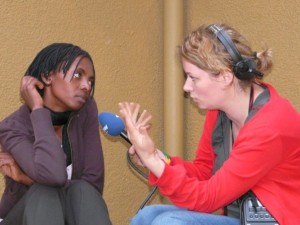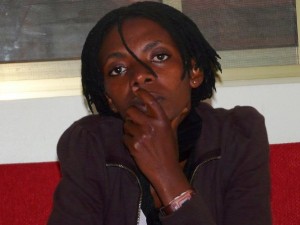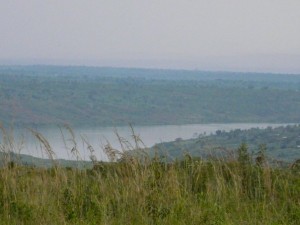Interviews – talking to a genocide survivor
As we’ve discussed in a previous blog post, so many skills go into making a good interview, especially for broadcast – from research and fact checking to crafting good questions to being a good listener.
But what about patience, empathy or just being human?
DW Akademie trainer and our Africa blog co-editor, Christine Harjes, reflects on the most challenging interview she has conducted: with a survivor of the Rwandan genocide.
I knew this would be a difficult encounter even before meeting my interview-partner
When I met Mediatrice, she was 24 years old. But at the age of 9 she lived through the 100 bloody days that saw Hutu-rebels kill nearly one million Tutsi and moderate Hutu in Rwanda.
Mediatrice was the only one from her family who survived the brutal killings. I could tell from talking to her on the phone that she was very shy and I was glad when she agreed meeting me in a café in Rwanda’s capital Kigali to chat a bit and then to take me to her orphanage village up-country to do the interview. I thought this was a good start to make her feel comfortable and during the two-hour-ride to her village we really warmed up, joked and laughed a lot. We never touched the interview-topic though.
Upon our arrival she showed me around the whole village and prepared first coffee, than tea before she went in search for a Coke. She was obviously buying time. I like doing interviews in an environment that’s familiar to the interviewee. In my experience the interviewee opens up more easily and feels more comfortable.
Mediatrice was also keen to find the right spot for our interview. First she sat down, shook her head, got up, went to another room, sat down again, didn’t feel well there and finally took me out the back of her house where we sat down on the grass. Fortunately the rear wall of the house protected my microphone from the wind and we had a gorgeous view over some of the famous 1000 hills of Mediatrice’s beautiful home country. Still it was impossible to imagine what she had seen and lived through right here.
Beating around the bush
Attentively, she looked at me. She was ready to answer my questions. Of course I had plenty of questions ready, and started with the easiest.
Mediatrice was a member of an acclaimed theater group that tried to come to terms with the country’s horrible past in its plays. In one of them, Mediatrice played the only genocide survivor of her family. So, I started by asking questions about her role and what it felt like to act in this play. She totally slipped into her role, saying things like: “I’m able to forgive the murderers but I can’t forget.” I was getting nervous because the transition from the play to her real experience seemed to become more and more difficult and she was obviously dreading it. I didn’t know what do to do. At some point I stopped the recording. We had some more tea and relaxed a bit, even joking around.
Then, I went straight ahead and attacked the topic. “This play seems to resemble your true life story a lot”, I said. She nodded and quietly said “yes”. “Do you think you could talk about what really happened to you?” I asked her. She was very hesitant and uneasy. That’s why I then changed my strategy and suggested that I don’t ask any questions. I often use silence in interviews to encourage people to talk but I had never done an interview without any questions. My plan was to produce a portrait of Mediatrice and there was no need really to hear questions in the audio. But would it work? She thought about my suggestion for a little bit and finally agreed.
Crouched on the grass, leaning to the raw walls of her house we sat there next to each other, both staring at the mic while she spoke. Telling me how she was hiding in churches, running from the rebels every day, and how she lost her mother in the chaos of constant running and hiding. She talked about girls that were violated with spears, pregnant women that were cut open and their unborn babies killed by the rebels. She spoke with a quiet controlled voice. The pain she felt was audible and visible. She spoke like that for 15 minutes. During the whole time we couldn’t look at each other. “It’s too much. I can’t say anything else,” she finally said and stopped. We were both trying to hide our tears. She was exhausted and busied herself with another pot of tea. Never before or after have I felt an interview-partner opening up like her. And listening back to my material I realized once again what a great present she’d made to me by telling me her unimaginable story.
Author: Christine Harjes







Feedback